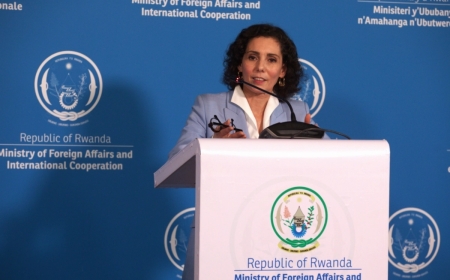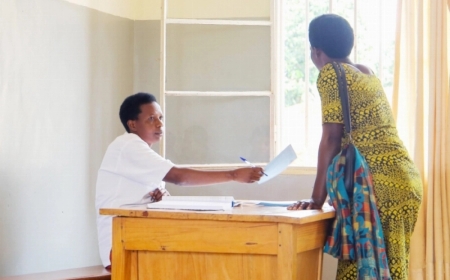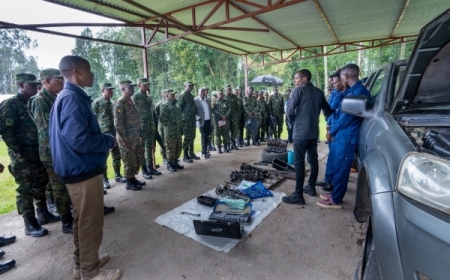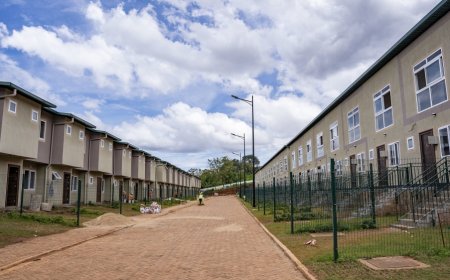Rwanda on track to eliminate Hepatitis B by 2030 - RBC

The prevalence of Hepatitis B in Rwanda stands at 0.25 percent, based on the latest annual report covering July 2023 to June 2024. This means that for every 100 people visiting health facilities and tested, 0.25 are confirmed positive.
Dr. Charles Berabose, the Director of Sexually Transmitted Infections and Other Blood-Borne Infections at the Rwanda Biomedical Center (RBC), said that although the figure is low, infection rates could be higher in certain vulnerable groups.
“These include people with weakened immune systems, such as those living with HIV, cancer patients undergoing chemotherapy, and people with chronic diseases like diabetes.
“Other vulnerable people include pregnant women, individuals in collective settings like prisons, refugee camps, rehabilitation centers, and key populations such as sex workers, men who have sex with men, and people who inject drugs,” he said.
Dr. Berabose said the Hepatitis B vaccine is included in Rwanda’s childhood immunisation programme, which has been in place since 2002.
Newborns from infected mothers receive the first dose within 24 hours of birth to prevent early transmission.
He added that catch-up vaccination is being carried out for people born before 2002, with a focus on those at high risk and people living with infected persons, noting that couples where one partner is infected and the other is not are encouraged to screen and vaccinate.
Dr. Berabose further adds that vaccination and testing services are provided free of charge at all health centers and hospitals.
He noted that more than seven million people have been vaccinated across the country, a figure that includes both childhood and adult immunisations.
Dr. Berabose explained that healthcare workers are also being prioritised for vaccination due to their exposure risk. The government has conducted mass testing campaigns in public spaces such as playgrounds and health facilities to increase public awareness and encourage more people to get tested.
“To date, we have screened more than five million people for Hepatitis B. From these, 9,000 are receiving treatment. This virus is incurable, so treatment is lifelong. The goal is to suppress the virus, reduce its load, and prevent complications.”
He added that Hepatitis B often goes unnoticed because it is mostly asymptomatic. When symptoms do appear, they tend to be non-specific, such as fatigue, nausea, vomiting, or yellowing of the eyes, which can easily be mistaken for malaria or other illnesses. This makes regular screening essential for early detection.
Dr. Berabose said many people only seek care when the disease has already caused severe liver damage.
“Patients often arrive with severely swollen abdomens caused by fluid buildup, a sign of irreversible liver damage. At this advanced stage, the condition cannot be reversed. Even with treatment, the liver may have already developed cirrhosis (a condition where the liver becomes severely scarred and damaged over time) or progressed to cancer.”
He urged anyone who has never been tested or vaccinated to visit the nearest health facility. Those who test negative are offered vaccination, noting that early action improves protection.
Hepatitis B is mainly transmitted through contact with infected blood or bodily fluids and can also be passed from mother to child during childbirth. Preventing transmission at birth is a central focus of Rwanda’s efforts to control the disease.
“We are screening all pregnant women twice, once during antenatal care and at delivery. This helps us detect infections early and ensure exposed newborns receive the birth dose of the vaccine within 24 hours,” he said.
The health expert added that 99 percent of infants exposed to the virus are receiving the birth dose on time, reducing the risk of infection.
Dr. Berabose noted that the government is increasing adult vaccination and screening efforts in prisons and detention centers, rehabilitation centers, aiming to reach as many people as possible, particularly those in high-risk groups.
On Rwanda’s progress toward the World Health Organization (WHO) goal of eliminating Hepatitis B by 2030, he said the country is on the right path.
“We are still screening people aged 15 years and above and focusing on mother-to-child transmission as a priority area. Awareness campaigns continue to push people to get tested, even if they feel healthy.
“Some people are surprised when they test positive because they feel well. Hepatitis B is often called a silent disease because it doesn’t cause pain. Those on treatment can live normal lives if they take their medication and keep regular follow-ups. But without early detection, the virus can cause serious health problems,” he stated.


































































